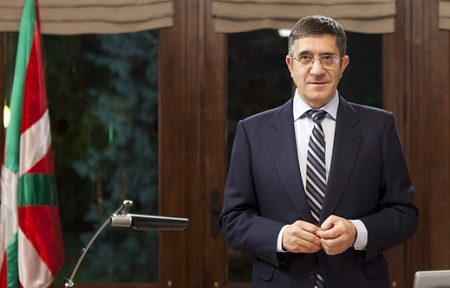With Europe expected to face its most tense times yet this autumn in its three-year-running eurozone crisis, and with Spain expected to seek a bailout from the European Union in the coming months, the Basque Country — a key autonomous region in Spain — is headed to the polls in October.![]()
![]()
Patxi López, the president (or lehendakari) of the Basque government (pictured above), called early elections Tuesday.
The election for the 75-member Eusko Legebiltzarra (or Basque parliament) will be held on October 21.
So what’s likely to happen? And what will it mean for Spain?
Essentially, the fight will come down to a four-way fight: (1) López’s federalist Basque socialists, (2) the federalist conservatives, (3) the traditional Basque nationalists and (4) a new leftist coalition of Basque nationalists. For now, at least, the chances that López will continue as lehendakari of the Basque Country currently seem slim.
López became lehendakari after the 2009 regional elections, when his party, the Partido Socialista de Euskadi – Euskadiko Ezkerra (the PSE-EE, or the Socialist Party of the Basque Country) joined in a coalition with the Partido Popular (the PP, or the People’s Party). The López-led coalition marked the first time in the three decades of democratic elections in the Basque Country that the region had not been governed by the Partido Nacionalista Vasco (the Basque Nationalist Party or the EAJ-PNV — in Basque, the Euzko Alderdi Jeltzalea).
That coalition unraveled after the PP won the Spanish general election in November 2011 — the local PP leader Antonio Basagoiti demanded that López not use his position to oppose newly-installed prime minister Mariano Rajoy, who has accelerated budget cuts at the federal level. López, however, has opposed Rajoy’s planned cutbacks, especially as regards health and education. Without PP support, López’s government commands just one-third of the seats in the Basque regional parliament.
The election will be held the day after the anniversary of the permanent ceasefire agreed with the ETA (Euskadi Ta Askatasuna), an armed Basque nationalist group that had engaged in many shootings, bombings and kidnappings. That ceasefire, agreed by then-prime minister José Luis Rodríguez Zapatero, a political ally of López, was one of the final landmarks of the Zapatero government before the Rajoy government replaced it. López is certainly hoping that voters will have that ceasefire on their minds on voting day, and that they will give his regional government credit for greater security and stability.
In 1978, the Basque Country — like Catalonia and Galicia — was granted the status of a nationality within Spain, as Spain wrote its new constitution, lurched toward democracy and began to emerge from the brutal and federalist four-decade dictatorship of Francisco Franco. But sentiment for autonomy and/or independence runs strong in the Basque Country, and that sentiment has all too often turned violent in the past, even after 1978. Continue reading Snap Basque elections may return nationalists back to regional government
